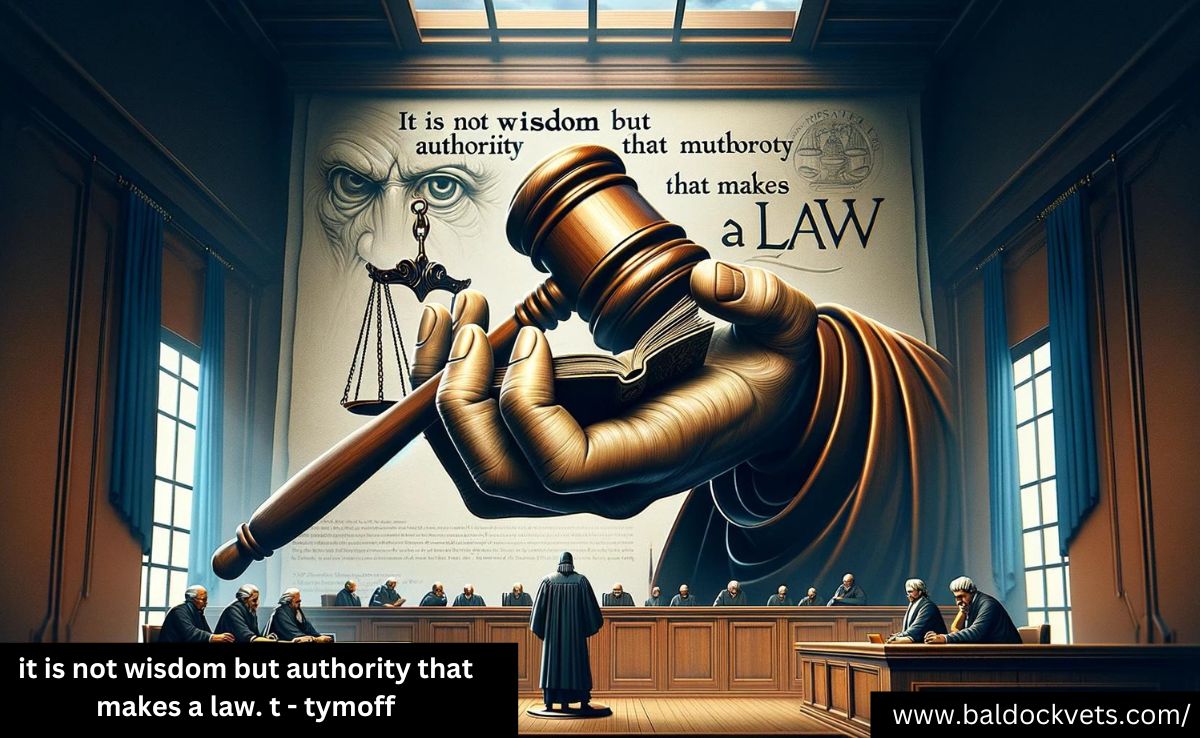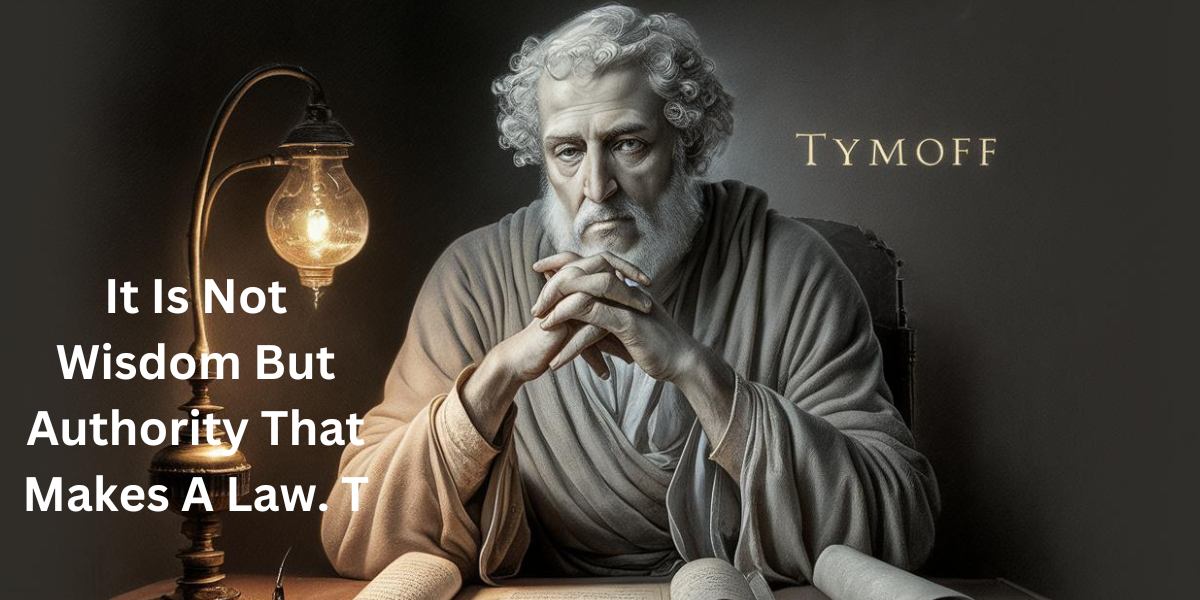Introduction to the quote by Tymoff
Laws shape our society, guiding behavior and establishing order. But what drives their creation? The thought-provoking quote by Tymoff, “It is not wisdom but authority that makes a law,” challenges us to consider the foundations of legal systems worldwide. Are laws born from profound understanding and moral insight, or do they stem primarily from those in power? This exploration delves into historical context, real-world examples, and the delicate balance between authority and wisdom in lawmaking—inviting readers to rethink the very principles that govern our lives. Join us as we navigate this complex landscape and uncover the truth behind what gives laws their strength and legitimacy.
It is not wisdom but authority that makes a law. t – off

The quote “It is not wisdom but authority that makes a law” by Tymoff captures a crucial aspect of legal systems. Authority often dictates what becomes law, regardless of its underlying wisdom.
Throughout history, many laws emerged from the power structures in place rather than ethical considerations or common sense. This can lead to regulations that seem arbitrary or unjust.
Consider it is not wisdom but authority that makes a law. t – of the Prohibition era in the United States. Laws were enacted based on moral authority rather than sound reasoning about public health and safety, creating widespread disobedience and social unrest.
While authority provides structure, it lacks the depth that wisdom brings to legislation. Wisdom encourages empathy and understanding—qualities essential for fair governance.
Balancing these two elements is key to ensuring laws serve society effectively. Without this balance, we risk perpetuating frameworks that lack legitimacy or respect among those they govern.
Historical examples of laws created for authority rather than wisdom
Throughout history, various laws have emerged that reflect authority over wisdom. One stark example is the Jim Crow laws in the United States. Enforced from the late 19th century to the mid-20th century, these statutes institutionalized racial segregation. They were rooted in authoritarian control rather than any ethical or wise consideration of human rights.
Another instance can be found in Prohibition during the 1920s. The U.
S. government attempted to outlaw alcohol based on moralistic authority and public pressure, disregarding its societal implications. Instead of creating a safer society, it fueled crime and corruption.
Nazi Germany presents another chilling case where laws aimed at consolidating power led to horrific consequences. The Nuremberg Laws stripped Jews of citizenship without regard for their humanity or contributions to society.
These examples serve as reminders of how authority-driven legislation can overshadow justice and common sense.
The impact of authority-based laws on society
Authority-based laws often reflect the power dynamics within a society. When laws are created primarily for control, they can lead to widespread discontent and resistance.
Such legislation may prioritize enforcement over justice. This breeds distrust between citizens and governing bodies. People begin to question the motives behind these rules, leading to skepticism about authority itself.
Moreover, when wisdom is sidelined, marginalized groups can suffer disproportionately. These laws tend to reinforce existing inequalities rather than promote fairness or equity.
The effects ripple through communities as individuals grapple with their rights and freedoms under oppressive regulations. Social movements often emerge in response, highlighting the need for reform rooted in understanding rather than mere authority.
When authority overshadows wisdom in lawmaking, it creates an environment fraught with tension and conflict. This imbalance stifles progress and fosters division among people who long for just governance.
The role of wisdom in creating fair and just laws
Wisdom serves as a guiding light in the realm of lawmaking, fostering fairness and justice. It allows lawmakers to consider not just the letter of the law but also its spirit and implications on society.
A wise approach involves understanding human nature, ethics, and cultural contexts. This deep comprehension helps create laws that resonate with people’s values and needs.
Moreover, wisdom encourages empathy among lawmakers, prompting them to listen to diverse voices within their communities. By prioritizing dialogue over authority alone, they can craft legislation that truly reflects collective experiences.
The essence of wise legislation lies in adaptability. Laws must evolve alongside societal changes to remain relevant and effective. Thus, wisdom acts as both a foundation for creating sound laws and a catalyst for continuous improvement in legal frameworks.
How to balance authority and wisdom in lawmaking

Balancing authority and wisdom in lawmaking requires intentional dialogue between lawmakers and their communities. Engaging citizens ensures that diverse perspectives are considered, fostering laws rooted in collective experience.
Regular consultations with experts can bridge the gap between theoretical knowledge and practical implications of legislation. This synthesis helps create informed policies that reflect societal values while maintaining necessary order.
Training programs for legislators focused on ethical reasoning can enhance their ability to discern when authority should yield to wisdom. Encouraging a culture of humility within governance allows leaders to learn from past mistakes, guiding them toward more equitable decisions.
Establishing checks and balances is crucial. Independent bodies can review proposed laws against ethical standards, ensuring they serve the public good without compromising justice or fairness.
Conclusion: Why laws need to be rooted in both wisdom and authority
Laws play a vital role in shaping society. They guide behavior and establish expectations. However, relying solely on authority can lead to unjust outcomes.
When laws are grounded in wisdom, they reflect a deeper understanding of human nature and societal needs. Wisdom brings compassion and foresight into the legal framework. It ensures that laws evolve with changing values.
An effective legal system requires a blend of both elements. Authority provides structure, while wisdom fosters fairness. Together, they create an environment where justice prevails.
This balance is essential for maintaining public trust in the law. People are more likely to respect regulations rooted in ethical reasoning rather than mere power dynamics.
Combining wisdom with authority allows for a more harmonious society where laws serve everyone equitably. This dual foundation encourages continuous dialogue about what is just and right.
Introduction to the quote
The quote “It is not wisdom but authority that makes a law” by Tymoff challenges our perception of what legitimizes legislation. At first glance, one might assume that wisdom—rooted in reason and experience—should guide the creation of laws.
However, Tymoff’s statement suggests a different reality. Laws emerge from established power structures rather than moral or ethical insight. This perspective invites us to scrutinize the motivations behind legal frameworks.
When we think about authority, it often conjures images of government officials or institutions wielding control. Yet this quotation pushes us to question whether those in power always act with justice and fairness in mind.
What happens when authority supersedes wisdom? The consequences can ripple through society, affecting everything from individual rights to community welfare. Understanding this dynamic is crucial for engaging critically with our legal systems.
The Difference between Wisdom and Authority
Wisdom and authority often intertwine in the realm of law, yet they serve distinct roles. Wisdom is rooted in understanding, experience, and moral insight. It guides decision-making based on what is just and beneficial for society.
Authority, on the other hand, derives from power or position. It dictates laws and regulations that must be followed, regardless of their ethical implications. Authority can enforce order but may lack the nuance that wisdom provides.
When authority overshadows wisdom, laws can become rigid structures devoid of compassion or fairness. This imbalance often leads to societal discontent as people question the legitimacy of enforced rules.
In contrast, when wisdom informs authority, it paves the way for thoughtful governance that resonates with people’s values and needs. Thus arises a critical relationship where both elements are essential for creating laws that truly serve humanity’s best interests.
How Wisdom Influences Lawmaking
Wisdom plays a crucial role in shaping laws that are both just and effective. It comes from experience, reflection, and understanding of the complexities of human behavior. Wise lawmakers consider not only the letter of the law but also its spirit.
When crafting legislation, wisdom encourages legislators to think beyond immediate effects. They ponder long-term consequences on society as a whole. This foresight can lead to more equitable solutions that serve everyone rather than just those in power.
Additionally, it is not wisdom but authority that makes a law. t – tymoff leaders often seek input from diverse communities. By listening to different perspectives, they create laws that resonate with various populations. This inclusivity fosters trust between authorities and citizens.
The essence of wisdom is empathy—understanding others’ struggles and aspirations. When integrated into lawmaking, it ensures that policies uplift individuals rather than oppress them.
The Role of Authority in Creating Laws
Authority plays a crucial role in the creation of laws. It is often seen as the backbone of legal systems worldwide. Without an established authority, laws lack enforcement and legitimacy.
Legislative bodies, governments, and institutions wield this power to dictate what is acceptable behavior within society. Their decisions shape norms and standards that guide individuals’ actions every day.
However, authority can be both empowering and limiting. While it provides structure, excessive reliance on authority may lead to arbitrary rules without consideration for justice or morality.
The balance between the authority’s reach and its responsibility is essential. When authorities act with transparency and accountability, they create a stronger bond with the public.
This relationship influences how laws are perceived—whether they resonate with citizens or feel imposed upon them. The effectiveness of law relies heavily on both respect for authority and engagement from the community it serves.
Examples of Wisdom-Based Laws vs Authority-Based Laws

Wisdom-based laws often emerge from a deep understanding of human behavior and societal needs. For example, environmental protection regulations are crafted with the knowledge that preserving nature benefits everyone in the long run. These laws reflect thoughtful consideration rather than mere compliance.
On the other hand, authority-based laws can stem from a desire to maintain control or enforce order. Take certain curfews imposed during times of unrest; they may not always address underlying issues but serve more to exert power over citizens.
In family law, wisdom is crucial when determining custody arrangements. Courts aim for decisions that prioritize children’s welfare based on emotional intelligence and developmental psychology. Conversely, mandatory minimum sentencing laws often illustrate authority’s grip without considering individual circumstances or context.
These examples highlight how the approach taken in lawmaking profoundly shapes our society’s values and outcomes.
It is not wisdom but authority that makes a law. t – off
The quote “It is not wisdom but authority that makes a law” by Tymoff challenges our perception of legality. It suggests that power, rather than insight or ethics, often dictates what becomes law.
Authority can impose order swiftly. Yet, this kind of legislation may lack the moral grounding necessary for true justice. Laws derived from sheer force can lead to oppressive systems where the rights of individuals are ignored.
In contrast, wisdom nurtures laws that reflect societal values and promote fairness. When lawmakers draw on collective experience and ethical considerations, they craft regulations with purpose and integrity.
Balancing these two elements—authority and wisdom—is crucial in shaping effective legal systems. Without thoughtful deliberation, laws risk becoming tools for control rather than instruments of equity. The challenge lies in ensuring that authority serves the common good while being informed by genuine understanding and compassion.
Conclusion: Striking a Balance Between Wisdom and Authority in Lawmaking

The delicate interplay between wisdom and authority in lawmaking is crucial. Laws must emerge from a foundation of reasoned thought, informed by the complexities of human experience. At the same time, they require an authoritative structure to ensure they are respected and upheld.
A society flourishes when its laws reflect both insightful understanding and legitimate power. Wisdom brings fairness; it considers nuances and promotes justice for all individuals. Authority offers stability, ensuring that those rules are enforced consistently.
Striking this balance can be challenging but remains essential for a functioning legal system. Lawmakers should prioritize not only their position but also the ethical implications of their decisions. When wisdom guides authority, laws become instruments of positive change rather than mere tools for control.
Laws rooted in it are not wisdom but authority that makes a law. t – tymoff both elements tend to resonate more deeply with society’s values, leading to greater compliance and respect among citizens. This harmonious relationship ultimately cultivates a healthier community where justice prevails alongside order—a necessary objective for any civilization aiming to thrive sustainably over time.



